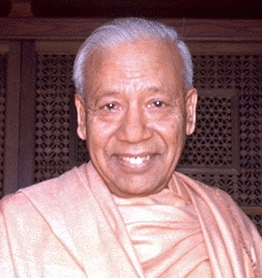Vedanta Center of Atlanta: July events

Vedanta Center of Atlanta: July events
Times:
10:30am-11am: silent meditation in the Chapel before each Sunday’s talk.
11am-noon: talk and worship in the chapel.
noon-1:30pm: devotees and friends meet in the Monastery for tea, coffee, snacks and a continuation of our spiritual fellowship.
Please join us!
PS: Please be on time. The service starts promptly at 11AM.
Venue: 2331 Brockett Rd, Tucker, GA 30084
Contact: (770) 938-6673 ; http://vedantaatlanta.org, http://vedantaatlanta.org/calendar-of-activities-events/
See Calendar for details about any particular Sunday.
July is a month for study of Raja Yoga, a spiritual path often called the yoga of meditation. As a raja yogi, you use ancient, proven spiritual techniques to quiet your mind and gain control of your attention. Regular daily practice of Raja Yoga increases your ability to concentrate, and may lead to meditation. This can unite you with the Divine Presence, the source of your being, and liberate you from the cycle of rebirth and death.
July 1, 11am-noon
Talk: “The Practice and Principles of Patanjali's Yoga”
with Br. Shankara
Swami Vivekananda (1863-1902), a Hindu monk, was born Narendranath Dutta in Kolkata, India. He first introduced Yoga to a wide audience of Americans in the mid-1890s, calling it Raja Yoga, the “royal path” to conquering one’s internal nature. Vivekananda’s translation of and commentary on Patanjali’s Yoga Sutras was published in July 1896. The book became a bestseller in the United States and Great Britain, influencing the spiritual and intellectual thought leaders of both countries.
Swami Vivekananda said, “Each soul is potentially divine. The goal is to manifest this divinity by controlling nature, external and internal. Do this either by work, or worship, or psychic control, or philosophy — by one, or more, or all of these — and be free. This is the whole of religion. Doctrines, or dogmas, or rituals, or books, or temples, or forms, are but secondary details.”
Vivekananda’s bold proclamation points directly to the purpose of Patanjali’s Yoga — the realization of one’s innate divinity by gaining control of the outer and inner aspects of the human form.
Many people who practice hatha yoga are acquainted with Patanjali’s Yoga Sutras — it’s usually a sourcebook for their instructors. Students are taught asanas (postures or poses) and other ancient, proven techniques to strengthen the body and quiet the mind. Patanjali claims these exercises lead to greater psychological and physical poise, heightened mental alertness, and increased psychic power.
Yet, serious students find these are just the first rewards for regular practice of Patanjali’s Yoga. Over time, they develop a much stronger ability to concentrate; this one-pointedness of mind may lead to meditation. From Patanjali’s point of view, that is the deeper purpose of perfecting the asanas and other techniques: They allow the body to sit perfectly still, comfortably, for long enough to turn a trained and calm mind within.
According to Patanjali, most of his methodology — six of the “eight limbs” of his yoga — is devoted to achieving this ability to meditate.
July 4 (Wed), 6:30pm – 9:00pm
July 4th Observance
You’re invited to join us on the evening of July 4th!
We will observe this auspicious day by celebrating the mahasamadhi of two great souls — Swami Vivekananda and Swami Prabhavananda. Both of these swamis left the body quite deliberately on a 4th of July (1902 and 1976).
Come to Chapel at 6:30pm, right after evening vespers (Arati). Our observance will open with a short talk by Br. Shankara. This will be followed by a song or two, then readings by members of our congregation (no more than 5 minutes each). We’ll conclude with another song, a poem and a prayer, then adjourn to the Monastery for a potluck supper. There might even be poppers, sparklers, and a few fireworks in the parking lot, after dark!
July 7, (Sat) Chandi Hymns
9-10am – will be read in Sanskrit.
10-10:30am – will be read in English.
July 7, 10am-2pm
SEVA SATURDAY is on the 1st Saturday again!

July 8, 11am-noon
Talk: The Irresistible Power of Satyagraha
w/ Br. Shankara
Satyagraha means insistence on truth. It has become known as a particular form of nonviolent resistance or civil disobedience. The power of satyagraha comes from the truth being insisted on, and practiced: Those who oppose or oppress you are also an embodiment of the Divine Being, and must be thought of and dealt with in that spirit.
This irresistible power of higher truth to overcome lower forms of truth is taught by such sages as Vasistha, Sri Krishna, Patanjali, and Swami Vivekananda. Success in both Raja Yoga and Jnana Yoga relies on relentless discrimination between lower and higher truth, and equally uncompromising insistence that only thought forms of the highest truth truly deserve your attention.
When you are persistent in these practices, Vivekananda says, spiritual victory is assured. Why? Because the highest truth is now and always was at the core of your being, waiting to be revealed as you set aside the layers of lesser truth behind which it is hidden.
NOTE: After each Sunday’s talk, devotees and friends meet in the Monastery from noon to 1:30pm for tea, coffee snacks and a continuation of our spiritual fellowship. Please join us!
 July 14 & 15 (Sat,Sun)
July 14 & 15 (Sat,Sun)
Weekend Retreat: “The Deep Significance of the Yamas & Niyamas”
with Swami Chandrashekharananda (Portland)
Two days of the Swami's wisdom on Raja Yoga.
Saturday, 10am-4pm - bring a bag lunch for noon break
7:30pm - Potluck Supper & Reception for the Swami
Sunday, 11:00am-12:00noon
July 22 – Talk: What Patanjali Means by Power and Freedom
w/ Br. Shankara
When we read to the end of Chapter 3 of Patajali’s Yoga Sutras, we find some astounding assertions about what a yogi can achieve. These unambiguous declarations let us know how limited our notions of power and freedom truly are.
 Films often portray extraordinary feats of personal power. Yoda, a character in the Star Wars series, easily lifts a full-size fighter plane from the depths of a swamp. His only tool is mastery of what Yoda calls The Force.
Films often portray extraordinary feats of personal power. Yoda, a character in the Star Wars series, easily lifts a full-size fighter plane from the depths of a swamp. His only tool is mastery of what Yoda calls The Force.
In Crouching Tiger, Hidden Dragon, a warrior sword-fights with a woman while they leap from branch to branch among the slender, swaying tops of a bamboo forest. How can they do this? As the young woman’s martial arts master taught her, “Listen with your mind.”
“There is no limit to the power of the human mind,” wrote Swami Vivekananda in his introduction to Raja Yoga, the swami’s translation of and commentary on Patanjali’s Yoga Sutras. By power the swami meant much more than a filmmaker’s demonstration of mind over matter — no matter how dramatic!
There are many levels of yogic power. Students of hatha yoga learn asanas and other practices that give them control of their bodies and minds. Regular practice of this yoga yields improved health and a longer life, physical and mental flexibility and poise, and grace.
Few yogis go beyond this level. Those who do may study the great sage Patanjali in depth. His teachings can lead to manifestation of far greater power, and total freedom. That’s what we will discuss this coming Sunday morning.
July 29 – Talk: Mantra & Meditation
w/ Br. Shankara
This Sunday morning we will define what a mantra is, explore the relationship between a mantra and concentration, and describe how concentration evolves into meditation.
Swami Vivekananda said:
Repeating the names of God (japam) has wonderful power …You must go on with your japam whatever direction the mind takes. — from Swamiji’s Complete Works, Vol 6

Swami Prabhavananda added:
Make japam: mantra contains the revealing power of the Word (OM) and other … names of God/Goddess and the Incarnations of God. — from “How to Know God”
What is meant by this revealing power, and how does that power help you “overcome the world?”
The following is from “Realizing God” by Sw. Prabhavananda —
When (you) receive a mantra, the sacred word — whatever the chosen ideal — the word OM is added to it to show that this chosen ideal represents the eternal Reality, the unchangeable, imperishable Brahman. (Yet, we) do not insist that you cannot realize God without the help of the word OM. ‘Various are Thy names, O Lord, in each and every name Thy power resides.’ We must remember that the name and the chosen ideal are identical. In other words, the moment you chant the name of the Lord, the presence of the Lord is there. (Emphasis added)
From there, we’ll explore what the Sage Patajali says about how japam leads to concentration, and how concentration matures into meditation.
AUGUST - Summer Break
All classes and talks during the month of August will be suspended. Only evening arati and the 1st Saturday Chandi reading in Sanskrit (10-11am) will continue as usual. Read more about how this break time will be spent, in the Resident Minister's report from the recent Annual Meeting of the Congregation.











